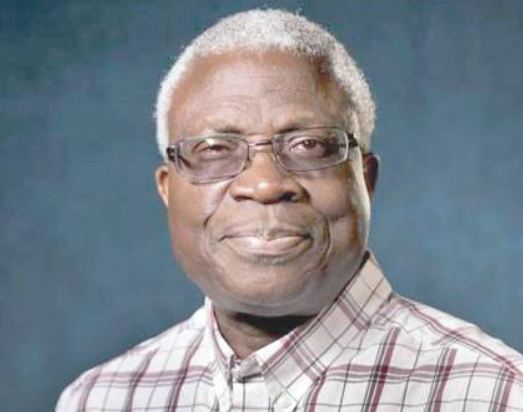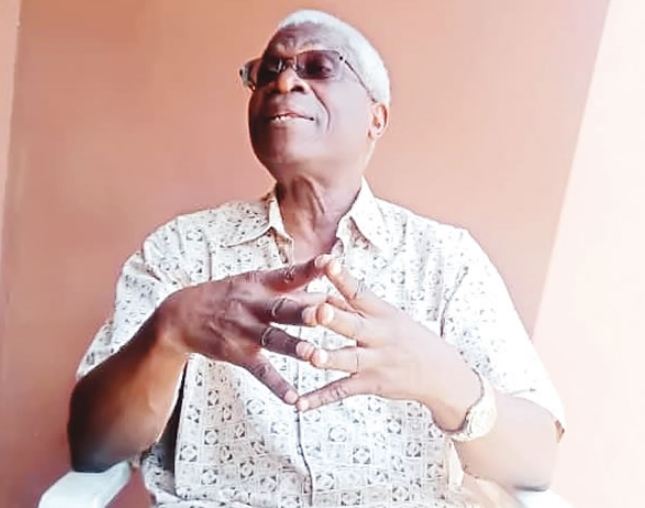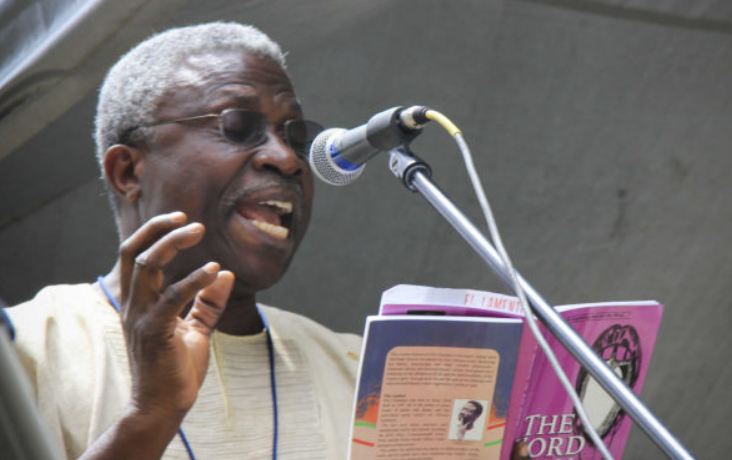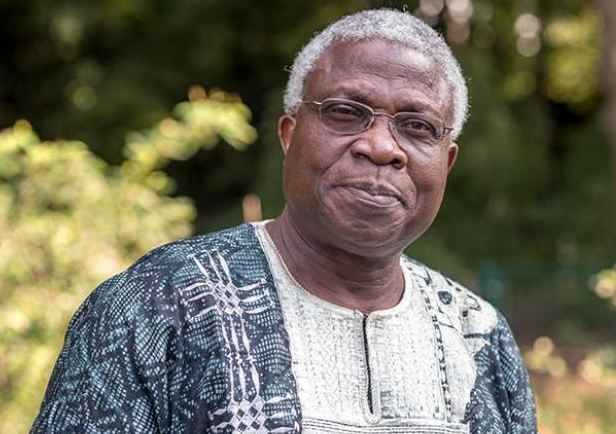
Niyi Osundare: 9 Ways to Contact Them (Phone Number, Email, House address, Social media profiles)
Niyi Osundare: Ways to Contact or Text Niyi Osundare (Phone Number, Email, Fanmail address, Social profiles) in 2023- Are you looking for Niyi Osundare 2023 Contact details like his Phone number, Email Id, WhatsApp number, or Social media account information that you have reached on the perfect page.
We are attempting to answer many of the most frequently asked questions by Niyi Osundare fans, and a large percentage of them are related to contact information. There is a lot of information about Niyi Osundare’s Fan Mail Address, Autograph Request Address, Phone Number, Email Address, and more details that you can learn about in the following sections of this article.
Niyi Osundare Biography and Career:
Ikerri, a small hamlet located in western Nigeria, is where Osundare was born in 1947. In the poem that takes his name, “Farmer-Born,” he refers to himself as “farmer-born peasant-bred.” Osundare’s father was a well-known musician in the community, and his grandfather was a diviner and healer on his father’s side. When Osundare was younger, he would go with his grandpa into the woods to collect medicinal roots and plants that could treat various conditions. Incantations were used throughout the healing process to bring the medicines to life and make them more effective. As a result, he was exposed to the power and significance of nature and words at an early age.
Osundare received his education from the Christian schools in his hometown and Ibadan University, from which he graduated with honors in English in 1972. After completing his undergraduate studies, he relocated to England to receive his master’s degree from the University of Leeds. Subsequently, he relocated to Toronto, Canada, to earn his doctoral degree from York University. In 1982, he relocated back to Nigeria to take a position as a professor at Ibadan University. Osundare won the first of his two titles in 1990.Scholarships awarded by the Fulbright Scholar-in-Residence program to do research at the University of Wisconsin. His second fellowship took him to the University of New Orleans, and in 1997 he was promoted to full professor of English there.
Osundare and his wife were two of the tens of thousands of people who lost their lives due to Hurricane Katrina and the accompanying floods in New Orleans in August of 2005. They were in danger of being carried away by the floodwaters, but the pair could climb to safety in their attic. There, they waited for twenty-six hours until a neighbor heard their calls for assistance and came to their rescue. After losing all of their possessions, including Osundare’s manuscripts, they were forced to spend the next two weeks living on the streets until they were welcomed into the house of an Alabama family.
Osundare got an email from Franklin Pierce College in New Hampshire offering him a teaching post while temporarily living in the family’s basement. The college is located in New Hampshire. Since that time, Osundare has made his home in Rindge, New Hampshire, with his wife. In Osundare’s poetry, musicality is one of the most critical components to look out for. Because he thinks poetry should be read aloud, his later works often contain musical suggestions. He held the belief that poetry should be read aloud. He said in the past, “When I perform in Nigeria, I have several musicians backing me up with various kinds of drums.” Each drum conveys its unique meaning via its symbols.
Drums are essential in their role as instruments of expression and interpretation. Poetry has a natural flow and its cadence. And the rhythm is there in every phrase and word. My native tongue, Yoruba, is often compared to music. Songs of the Marketplace (1983), Osundare’s first published collection, proves that these principles were important to him. This collection is title refers to the vivacity of African marketplaces, which serve not only as places of trade but also as communal hubs where people congregate to socialize with one another. However, despite the book’s implicit focus on African music and culture, the individual poems are critical of the socioeconomic and political realities afflicting contemporary Nigeria. This is the case even though the book is about Africa.
Osundare’s poetry “Excursion” provides a litany of portrayals of African poverty, then contrasted with the callousness of the wealthy and powerful: “Several government people / have passed through these streets. / Several Mercedes tires have drenched gaunt road liners in sewer water. Osundare continued to bemoan Nigeria’s social and economic inequalities in his second book, which was published in 1984 and titled Village Voices. This was especially true when the oil boom delivered extraordinary riches to the highest sections of society with unparalleled levels of political corruption and greed during the 1970s and 1980s.
In the book-length article released in 1986 under the title The Writer as Righter: The African Literary Artist and His Social Obligations, Osundare elaborated on the authors’ role in drawing attention to the social issues that are prevalent in Africa. Osundare returned to poetry in 1986 with the publication of A Nib in the Pond. This time, he did it with a socialist intent, devoting many of his poems to socialist figures like Fidel Castro and Agostinho Neto. Osundare first started addressing environmental concerns in his poetry with the publication of The Eye of the Earth (1986), and this concern is present throughout the whole of his body of work.

Osundare used a different approach while writing Songs of the Season (1990). He purposefully coached his pleasant thoughts in straightforward and understandable language to appeal to the broadest potential audience. The poems take the form of satires, dialogues, tributes, and parables, and their topics are events that were happening at the time on a national and worldwide scale. Osundare was awarded the Noma Prize in 1990 for his collection of poetry titled Waiting Laughters. These poems are intended to be read aloud and accompanied by music.
It has been said that the piece is an “experimental orchestration around a major theme.” Osundare explored his nation’s stalled growth through his experiences as a middle-aged man in his 1993 book Midlife, where he switched to a more reflective and personal subject matter. More poems inspired by Nigeria’s urgent need for political change and the country’s collective memory of its struggles may be found in the anthology Horses of Memory (1998).
Osundare’s awareness of the power of language is brought to the forefront in his collection of poems titled “The Word Is an Egg” (published in 2000). The poems in this collection focus on writing in the language of one’s colonizers, the role of words in forming personal and national identity, and the social and political abuse of language in the forms of censorship and illiteracy. In his most recent collection of poems, Tender Moments (2006), Osundare emphasizes the complexities of human relationships rather than the politics and societal evils that are often the subject of his work. This is a departure from his typical concentration on these topics.
Osundare is highly regarded as a poet because he investigates contemporary Africa’s social and political state with melody and a sense of humor, despite the sometimes depressing subject matter of his writing. Critics often note the human nature of his work, notably in his evocation of history and memory via the use of traditional African literary and musical components that appeal to ordinary people. In particular, this quality can be seen in his use of traditional African musical and literary elements.
Despite what seems to be an irreversible decline in the nation’s worldwide image and importance, Nigerians have continued to bring the country renown and glory via their reputations and the feats they have achieved. This is primarily because of the country’s bad leadership. Recent accomplishments include Temilade Openiyi’s victory in the coveted Grammy award and Dr. Wale Okediran’s Gold Medal for Productivity in Literature prize at the just-ended Eurasian Literary Festival of Festivals in Cairo. These awards were presented to Dr. Wale Okediran, a famous physician and writer.

Egypt is the most recent example of such prestigious honors that have rubbed off on Nigeria’s drooping reputation among countries. Nigeria’s status has improved as a result of these honors. Niyi Osundare, a Distinguished Emeritus Professor, linguist, and poet who has won several awards, was presented with the Boao International Poetry Prize for Outstanding Achievement in Poetry in China just before these two were honored. This award was given out on December 16, 2017, to be exact.
The poet laureate, who was unable to attend the award ceremony, which took place at the 2022 Boao International Poetry Festival in Shanghai, reacts with conflicting emotions to the accolades that they have received. On the one hand, he views the achievements of Nigerian artists on the international stage as proof that the country is home to an abundance of unrecognized talents. Still, on the other hand, he is even more disheartened by the fact that Nigeria itself lags, if not entirely missing, in the international collaborative efforts to foster cultural and artistic development and promotion.
Since poetry is the sister of song, it is sometimes called music’s “soulmate.” It is the lengthy, unmeasurable song that humanity has created, and each tongue has contributed a stanza to it. Its sounds may differ from language to language. Still, its hearing contains the magic of memory, allowing it to locate fundamental similarities in every language. This magic is also the master of motion and movement, of swinging in a calculated way and swaying smoothly. Poetry is the art form that most effectively beats the drum of language, and in many ways, poetry is the drum. Its fundamental communication with the human body is conducted in response to commands and involves no force.
Both the body and the ear react to the rhyme and rhythm of the sound. The force that poetry has comes from the allure that unwinds the wind and the sound that unsettles the conspiracy of quiet. A brand new book with 240 pages with the Korean translation of a selection of my poems made its way into my hands a few weeks ago. It had been sitting in the parcels vault of the Nigerian post office for six months while it was being held there. Although it took a long time to arrive, it was welcomed with open arms.
My literary career spans four decades, and these poems represent a cross-section of my topic preoccupations and stylistic quirks. They are collected in a substantial collection that has been carefully chosen. The translator did an exceedingly competent job, as pointed out in the laudatory prologue that can be seen below, in selecting poetry that reflects the whole.
But beyond these virtues, there are lessons that I have learned from the lengthy, complicated, and frequently bewildering process of translation that are worth sharing with readers. This is because these lessons are instructive instantiations of literature’s role in cultural diplomacy, international understanding, and the discovery and cultivation of socio-political affinities where we might have previously thought that none existed.

Autograph Request Address of Niyi Osundare
Requesting a signature from Niyi Osundare is becoming one of the most popular choices for fans who are hectic and locked in their daily normal routines. If you want Niyi Osundare’s signature, you may write him an autograph request letter and mail it to his office address.
Autograph Request Address:
If you anticipate a speedy answer, include a self-addressed, sealed envelope. Include a photo of Niyi Osundare in your autograph request letter if you want a signature on his photo. A response from a celebrity’s office usually takes a couple of weeks, so be patient.
Niyi Osundare Profile-
- Full Name– Niyi Osundare
- Birth Sign- Pisces
- Date of Birth– 12 March 1947
- State and Country of Birth– Ikere, Nigeria
- Age -76 years (As 0f 2023)
- Parents– Father: NA, Mother: NA
- Cousins– NA
- Height– NA
- Occupation– Poet
Niyi Osundare Phone Number, Email, Contact Information, House Address, and Social Profiles:

Ways to Contact Niyi Osundare:
1. Facebook Page: https://www.facebook.com/NOIPOFEST/
Niyi Osundare has a Facebook account where he publishes his pictures and videos. The above-mentioned URL will take you to his profile. It has been verified, and we can certify that it is a 100% accurate profile of Niyi Osundare. You may contact him on Fb, which you can find by clicking the link here.
2. YouTube Channel: NA
Niyi Osundare has his own channel on youtube, where he uploaded his videos for his followers to watch. He has also earned a million subscribers and thousands of views. Anyone interested in seeing his uploads and videos may utilize the account URL provided above.
3. Instagram Profile: NA
Niyi Osundare even has an Instagram account, in which he has over a thousand followers and gets over 100k likes per posting. If you would like to view his most recent Instagram pics, click on the link above.
4. Twitter: https://twitter.com/NOIPOFEST
As of yet, Niyi Osundare has gained a large number of followers on his Twitter account. Click on the link above if you’re willing to tweet it. The link above is the only way to get in touch with him on Twitter.
5. Phone number: +234 8028708577
Niyi Osundare’s many phone numbers have been released on Google and the internet, but none of them truly function. However, we’ll let you know as soon as we’ve located an exact number.
6. Fan Mail Address:
Niyi Osundare Ikere, Nigeria
7. Email id: NA
8. Website URL: NA
Also Checkout: How to Contact Patrick Utomi: Phone Number, Email Address, Fan Mail Address, and Autograph Request Address
